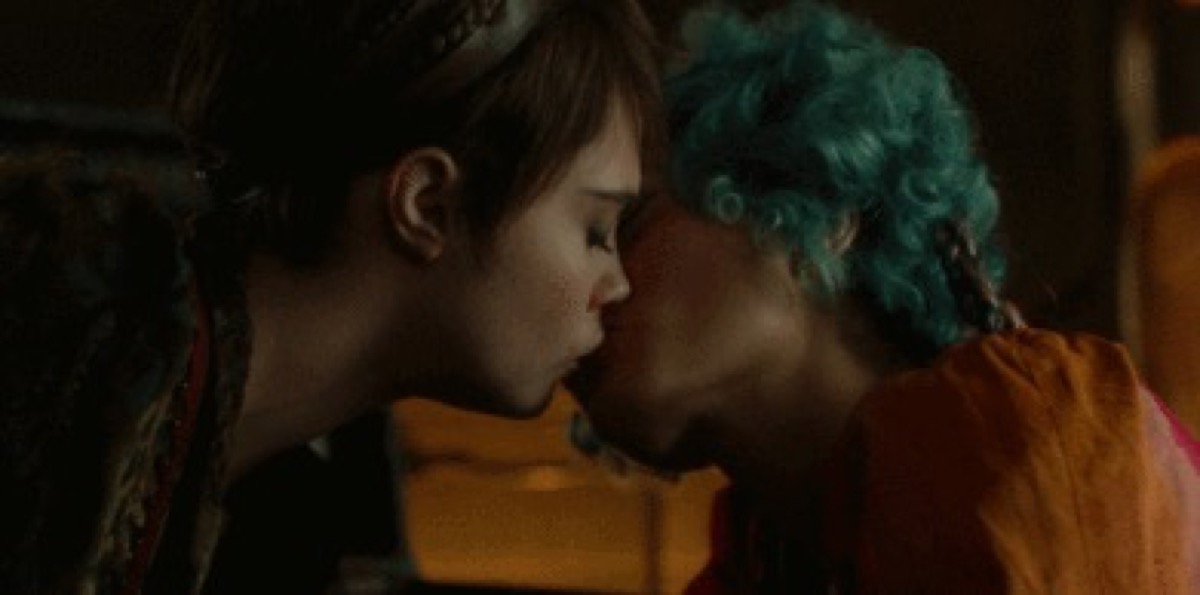Vignette’s Bisexuality Is the Only Good Thing About Carnival Row

**Spoilers for Carnival Row ahead.**
Ahead of its release, Amazon Prime’s Carnival Row seemed to have it all: Cara Delevingne playing a feisty fairy pulling an Irish accent and Orlando Bloom doing his best impression of an East London detective in a neo-noir fantasy setting. The show, which premiered on 30 August and immediately got renewed for a second season, features some interesting LGBT representation, with a particularly refreshing portrayal of bisexuality, which we rarely get to see onscreen.
Yay? Not quite, because this might be the only good thing about the series.
Carnival Row, which calls out racism and discrimination of all sorts, feels like a visually stunning, yet narratively lazy, only mildly enjoyable summer watch with too much on its plate.
Set in a neo-Victorian society, the ambitious ten-episode series follows fairies and other mythical creatures forced to flee their homeland after the war. They all gather in a grim city that isn’t exactly welcoming of foreigners. The Burgue is plagued with a string of unsolved murders occurring in its dodgy end, the Carnival Row that gives its name to the show.
Human detective Rycroft “Philo” Philostrate (Bloom) is as adamant to track down the killer targeting faes as he is determined to hide a secret well-buried in his own past. As he’s investigating, he bumps into Vignette Stonemoss (Delevingne), an immigrant fairy who has a pretty good reason to hold it against him.
The audience soon learns that Vignette, very much like Delevingne, who portrays her, is bi.
She, in fact, has an undeniable bond with her fae friend and former lover Tourmaline (Karla Crome). The two meet again in The Burgue, where Tourmaline works as a prostitute. It’s revealed they’ve known each other for a long time and had been in a relationship before Vignette fell for Philo.
Sadly, this might be the only interesting aspect of the show, and one that isn’t explored thoroughly, as opposed to the main romance between Philo and Vignette. What’s worse, the chemistry between those two protagonists is, quite frankly, hard to buy.
Watching Vignette and Philo have what is supposed to be the most incredible fairy sex (fairies can actually fly while climaxing) is so cringeworthy you’ll wish you could unsee it. Except you can’t. Also, let’s not forget that Bloom is 15 years older than Delevingne, which might play a part in that cringe, but hey, she’s supposed to look younger because she’s a fairy, right?
On the other hand, the sweet way Vignette and Tourmaline look out for one another and the believable, palpable affection they share feel real. And—sorry not sorry—the quick onscreen kiss between them is more sensuous than a full-nude sex scene with Philo.
While they don’t necessarily have to get back together, it would be worth showing more of Vignette and Tourmaline’s past romance, which is only hinted at in the show.
What is positive about Carnival Row is that it features several queer characters, and this is still quite unusual for a show that isn’t primarily focused on LGBT issues. Vignette is far from being a token LGBT character, as the series also tell the story of two men in love with one another who had to hide that feeling for their whole life.
However, the show throws this in without discussing the prejudices queer people face in depth. Therefore, a second season might be able to dig deeper into LGBT-phobia, together with all other forms of intolerance faced by The Burgue’s residents.
While it’s great to have some LGBT representation in a big production like Carnival Row, it’s a shame that the show itself doesn’t live up to the hype it generated at first.
It’s a rather disappointing waste of good actors and an entertaining, albeit unoriginal, storyline that would have made for a decent film. The series, created by René Echevarria and Travis Beacham, was indeed a movie script and originally involved Oscar-winning director Guillermo del Toro.
To mention but one of the show’s many flaws, the main plot twist—an interesting take on the usual colonizer-falling-for-the-colonized trope—is revealed early on in the season, in a distracting, overly explanatory episode that takes the action to another land before the audience can invest in the story. There is very little to invest in the overused trope of a man abandoning and lying to a woman out of “too much love,” anyway.
Eager to touch every possible fantasy subject to tie in with our own time, the series ends up being painfully predictable. It proves that important topics alone—LGBT issues being one—are hardly ever enough to make for a good, memorable story.
We sure don’t need another season of Carnival Row and its main romance, but some more Cara Delevingne playing an openly bisexual fairy is definitely a good starting point to address LGBT themes further. That’s something we’d like to see, but I hope it’s not the only good thing about season two.
(image: Amazon Prime Video)
Stefania Sarrubba is an Arts and Culture journalist based in London. When she is not adding movies she will probably never see to her infinite watchlist, she likes spotting urban foxes, making plans and engaging in passionate conversations about women’s rights. Read her annoying tweets on @freckledvixen.
Want more stories like this? Become a subscriber and support the site!
—The Mary Sue has a strict comment policy that forbids, but is not limited to, personal insults toward anyone, hate speech, and trolling.—
Have a tip we should know? tips@themarysue.com